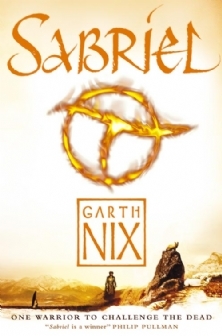When Sabriel was a young girl, she was sent from the wild-magic lands of the Old Kingdom, over the wall to Ancelstierre. Now, over a decade later, her father is gone and she has inherited his mantle. Now she must make her way into the heart of magic to save what she most holds dear.
If I were asked to describe this book in one word, it would be this: boring. If I were given three more, they would be: confusing world building.
The story starts off with the titular Sabriel's birth. While there are few openings I like less than that for fantasy books, I will admit that it gave information that would have been difficult at best - and distracting at worst - to fit in otherwise. So, I overlooked that.
Then comes the first chapter and we were off to a rolling start. We're first introduced to a newly adult Sabriel when she resurrects a dead bunny for a younger classmate and is viewed with a nice bit of superstitious fear. Next she's off dealing with a Death servant that has broken into the College and is currently causing the underclassmen to scream. Brilliant start. However, that's all the first chapter and things start to go downhill very quickly from there.
Honestly, I should have known better. This book has a map in the front of it. Fine, right? I mean, most fantasy books do and I love flipping back to the map to check the location of places. However, in this case, sixty miles is less than an inch. That means this fairly small map covers a huge amount of land. And, of course, like all good fantasy books, they put that landscape to use.
So, Sabriel sets off on her epic journey. I hate epic journeys. I much prefer mundane ones, but I kind of hate all journeys in fantasy books. To make this one worse, she's going it solo. That's not to say I hate Sabriel. Au contraire, she was too flat for me to feel anything for. I did think it was nice however, to see a male author handle a female character as a character first and a female second. In fact, her being a woman/girl seemed irrelevant to most everything about this book. For this, I give Garth Nix a big thumbs up. He did well. However, for me, Sabriel is way too serious. She's almost a stuffed shirt and with no quirks that endear her to me.
The world-building truly confuses me. Fairly early in the story (chapter two, I think) we are given our first glimpse of a world that isn't typical to fantasy. There's this wall that sounds like something right out of World War II. The soldiers that guard it carry machine guns but wear chain mail. They also know that swords, pikes and maces are more dangerous to the things they guard against, so they carry those too. There was a time I would have ignored a fantasy book simply because of this, but I've been looking for stories that blend technology and magic lately.
This seemed like a good choice. Right up until they mentioned trucks. Then, before two pages were out, came the mention of a rubber duck then a football field. I did a little research. Assuming that the tech in this world was apace of ours, it would have to be around nineteen-forty at the earliest. Probably a bit later, allowing for the rubber duck to become popular enough that a schoolgirl had heard of it and, with the assumption that she had actually used one, probably around nineteen-sixty.
So, I'll assume that the world would have other tech that is equivalent to that era. Of course, this is only an assumption, because bandying anachronistic words around doesn't equal 'world-building'. In this regard, this book reminds me of the awful 'All the Paths of Shadows' that did much the same thing. (Of course, at least Sabriel doesn't hate being a woman the same way that main female did.) Later, there was mention of flying machines that sounded like German work during the 1920's and 30's.
Now let's talk about the wall, built to keep the Dead out and the humans in - that succeeds better on the latter than the former - and divides the Old Kingdom from Ancelstierre. First of all, from all sounds, the wall has been up for many, many years. Maybe a few hundred, in fact. It makes me wonder, if this old work is still the best for the job, if technology and advancement stopped…well, advancing. Stagnating, like most other fantasy worlds do.
The Old Kingdom is an unpleasant place. Our first true glimpse of it is in Ancelstierre's autumn but the Old Kingdom's full-blown, freezing winter. Yep, just three feet and you go from moderately nice, sunny weather to dusk with a freezing wind. It was never explained why, but I was willing to take it on faith that the magic in the wall kept back the evil magic of the Dead in the Old Kingdom that influences the weather somehow. And there were many Dead in the Old Kingdom. However, it was also early afternoon in Ancelstiere, but almost dusk in the Old Kingdom. Why? Does the wall bend time or does the magic?
We get this little tidbit from Sabriel on the Old Kingdom:
'[…]She felt a pang of sympathy for the poor people the Dead had enslaved. Many would probably freeze to death, or die of exhaustion, only to be brought back as dull-witted Hands. Only those who went over the waterfall would escape that fate. Truly, the Old Kingdom was a terrible place, when even death did not mean an end to slavery and despair.'
Oh ho. Time for me to flip back to that map and…just as I suspected; the Old Kingdom has many towns and roads. In fact, Sabriel herself was born there, to a band of travelers, as we discover in the prologue. However, this is where my problem really starts.
If the conditions are as bad as they appear, (and I think being forced into slavery for all eternity is pretty bad) why the hell is there still people living there? I know, you don't want to leave your house, but if the alternative is eternal slavery, (and, for the record, I don't think slaves are allowed to live at home) why would you choose to stay in that place?
The king/queen/regent at some point should have looked at all the people - their people! - that were dying and decided it was too high of a price to pay. They should have begged Ancelstierre or any other kingdom in the world, to take their people in. Tell them that you'll work to become citizens.
Also, apparently you need papers to travel into the Old Kingdom - which is also treated as a tourist attraction - (the hell?) because you don't want the Dead traveling into our country. (Although I don't know how restricting who can enter the Old Kingdom actually solves that.) Anyway, what I'm getting at is thus: with all this 'Charter magic' (*cough*symbol magic*cough*sound magic*cough*) at your disposal, surely some of your practitioners would be able to tell if the person is living or Dead. Or hosting a Dead - or whatever the people are so afraid is coming through. (Yes, in fact touching the forehead of one marked by charter magic - which, from what I gathered is something like a worldwide baptism, actually tells you if the person is fully human. Of course, I think the person toughing the other would have to be a charter mage, but it's not like there's only one in the whole world.) They could have evacuated the whole Old Kingdom and treated the citizens as refugees.
Instead they essentially boarded up a country for having a non-contagious disease.
I did like the idea of necromancers in this story, as they have to walk the river of death to get the dead back. There's also gates - though I didn't fully understand that. It seems as though once you pass a certain gate, you are well and truly dead, in that no living person can walk there to get you. If, however, there's a Dead with you that is strong enough, you can still be brought back to a false life. Adding to the confusion, at least one Dead held on near an early gate tenaciously enough to pull himself back. And I won't even get into how confusing the 'resurrection' scene was.
I know this book is one of the 'independent-female/young adult fantasy' books to read, but it just wasn't for me.



